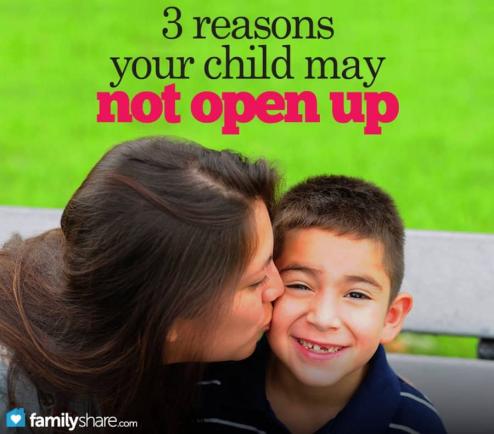
One of the most frustrating things, when raising teens, is when you feel like you are losing contact with them and they no longer talk to you. While it is true that teenagers will share less with parents and more with friends, you could be unknowingly creating reasons why they won't open up. Here are three reasons or issues to consider when your teen clams up:
Does your teen feel pressured to give you the right answer?
If your child continually feels like he needs to give you the "right"� answer or else the conversation will continue until he does, he will stop talking. When you want to establish a good relationship with your child you need to let them have time to talk to you about what they want to talk about, answer questions in their own way, and share their own concerns. If you are using the time you communicate to simply begin dictating more rules or going over problems your child is going to be less likely to open up. Good relationships include trust as well as open communication where your child feels comfortable talking to you about anything. In fact, you want your child to feel like they can come to you to begin a conversation, anytime.
Does your child feel like you aren't really listening?
When your child comes to you with a concern it's important to remove yourself from all other distractions. Turn off the television, put down the cell phone, walk away from the computer, and leave the other kids in a different room. Sometimes, the only thing your child needs in order to open up to you is your undivided attention. When a child feels like they are competing with media, electronic devices, or siblings they will not feel like talking. Don't you feel the same when you are trying to get your child's attention away from the latest video game? An easy solution to this problem is to create specific times to focus on each child individually whenever possible and have small conferences or times for communication. This could be done at home in a quiet place, or away from home over ice cream or some other shared dessert. The goal is to find time when both you and your child can focus on the conversation you are having without outside distractions.
Maybe your teen feels like you don't open up, either
As a parent, you are the first example to your child on how to handle situations. If you are more of a quiet or withdrawn person your child is likely to be one, as well. What could help you get your teen to open up is to try talking more yourself. If you will work on sharing more your child will make the effort, as well. You can also encourage your child to talk freely by asking open ended questions that require more than a simple one word answer. These will help both of you begin a meaningful dialogue.
When your teen doesn't seem to be opening up to you it can be frustrating, but if you'll take the time to refocus your attention on them and find the right space and time you might just be surprised at how much more they will be willing to share.

